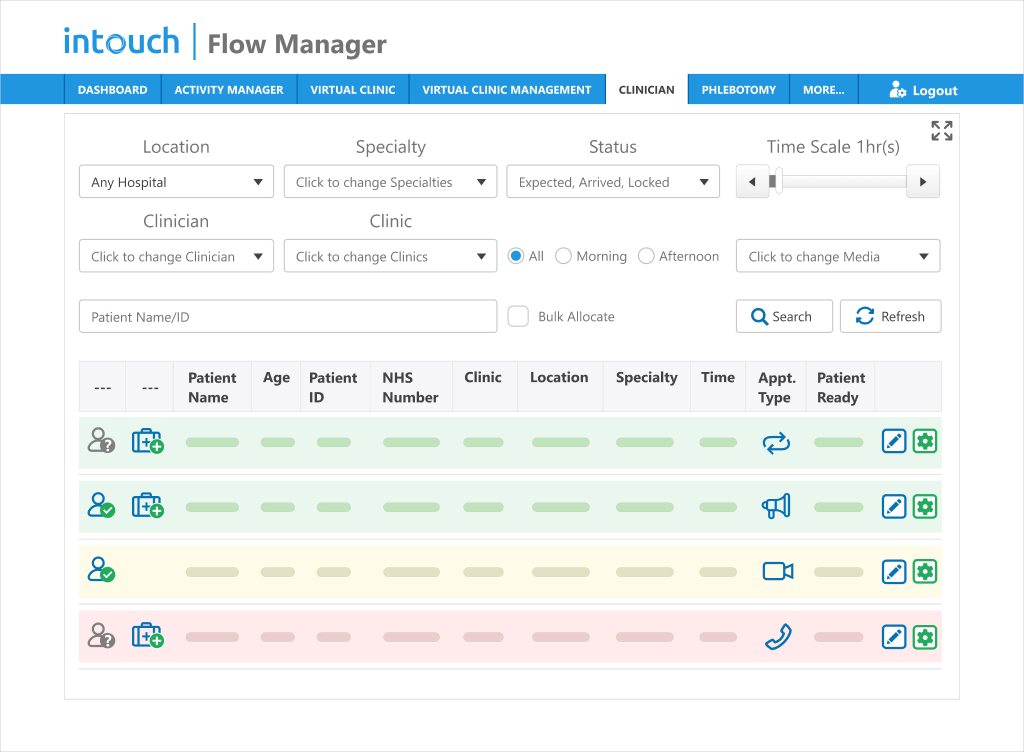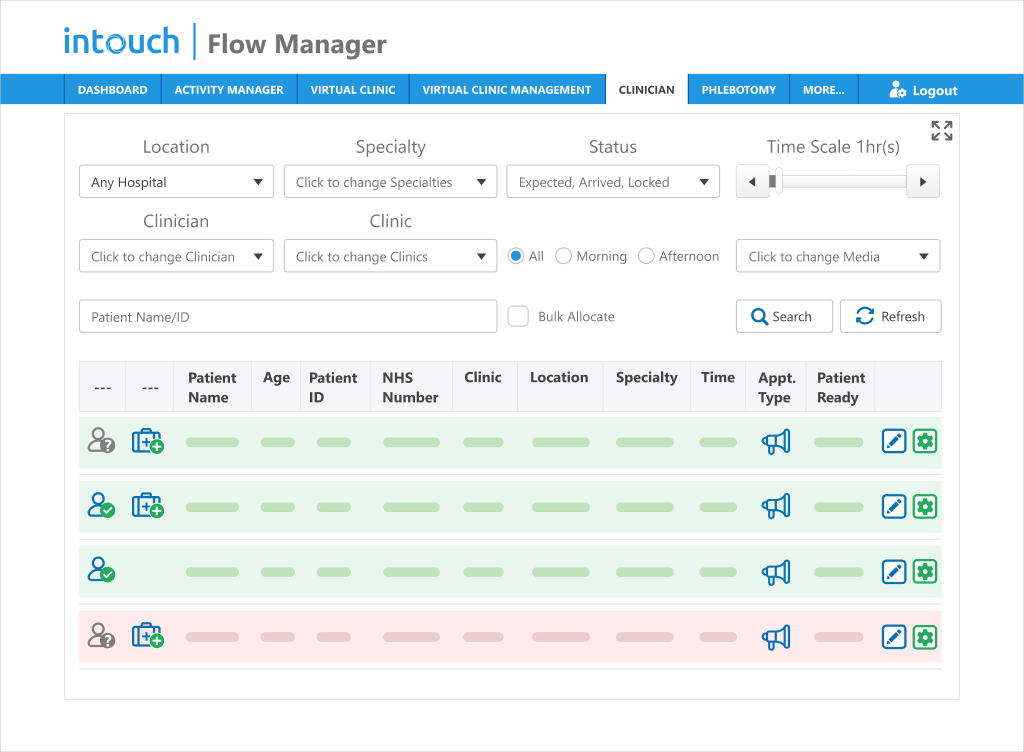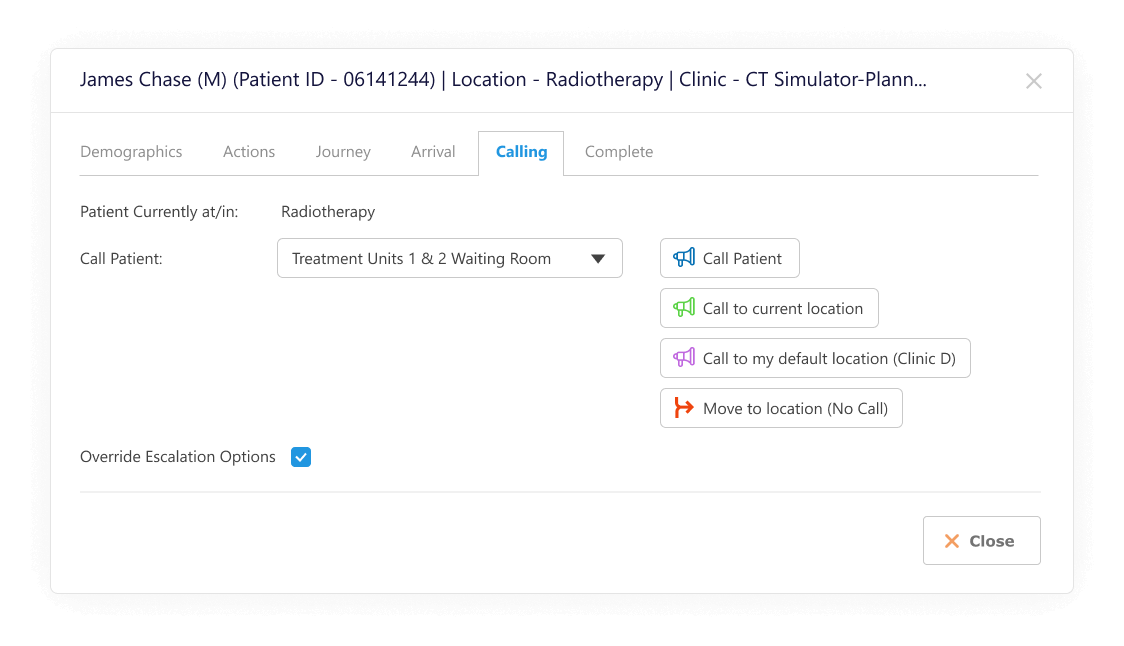Processes over 55 million outpatient appointments annually
Flow Manager
A centralised patient flow dashboard, enabling staff to efficiently manage each stage of the outpatient journey, from one location.
Why Flow Manager?
Optimise patient flow
Streamline operational processes and improve communication channels
Real-time patient visibility
At-a-glance, all staff can see which patients have arrived, which are late and who they are still expecting
Identify patient flow blockages
Support staff to identify potential ‘bottlenecks’ in the patient journey and intervene to reduce delays
Improve operational efficiency
Reduce and streamline processes to save time and realise significant operational efficiencies
Support NHS Net Zero targets
Reduce the environmental and financial impact of paper processes, including printing, paper transportation and storage costs
Elevate the patient experience
Streamline patient flow and operational processes to reduce the time patients spend in hospital
Flow Manager provides oversight of every outpatient journey in real time, whether the appointment takes place inside the hospital, remotely in the community, or virtually at the patient’s home.

Manage all appointment types
Flow Manager supports staff to optimise patient flow by providing real-time oversight of each patient journey, from the patient’s arrival to discharge, follow-up appointment or onward care. From one centralised dashboard, staff can manage all appointment types – face-to-face hospital appointments, virtual (video or telephone) appointments or remote appointments in the community. Appointment tests and activities can be booked in advance, creating pre-planned workstreams. Flow Manager currently processes over 55 million outpatient appointments annually, including 56% of all NHS outpatient attendances.

Optimise patient flow
When a patient checks in using a kiosk, the mobile app, or at the reception desk, their status is automatically updated on the Flow Manager patient flow dashboard, alerting staff to their arrival. Flow Manager integrates with multiple hospital systems, including Electronic Patient Records (EPR) and Patient Administration Systems (PAS), to enhance care coordination, supporting a joined-up approach to patient-centred care and optimised patient flow workstreams, as previously isolated systems and processes connect seamlessly.

Elevate the patient experience
Clinicians can call patients directly to the clinic room via wall-mounted screens from the Flow Manager dashboard. Any patients flagged as visually impaired will be called with a high-contrast display, and the patient’s identity can be anonymised if required. By capturing key data during each patient journey, Flow Manager can also communicate potential clinic delays to patients via wall-mounted screens, helping improve communication channels with patients and manage expectations, supporting an evaluation of the patient experience.
What makes Flow Manager different?
Processing 56% of all NHS outpatient attendances, Flow Manager provides staff with oversight of each patient journey in real-time, from the patient arriving for their appointment through to discharge, a follow-up appointment or onward care.
Staff can manage each stage of an outpatient journey, across all appointment types, including:
• face-to-face hospital appointments
• virtual (video or phone) appointments
• remote appointments in the community
When a patient checks in using a kiosk, the mobile app, or at reception, their status is automatically updated on the dashboard. Icons including ‘visually impaired patient’ or ‘interpreter required’ alert staff and help deliver a better patient experience. Clinicians can call patients to the clinic room via wall-mounted screens. Any patients flagged as visually impaired will be called with a high-contrast display, and the patient’s identity can be anonymised if required. By capturing key data during each patient journey, Flow Manager can also communicate potential clinic delays to patients via wall-mounted screens.
Integration with multiple systems including Electronic Patient Records (EPR) and Patient Administration Systems (PAS), enhances care coordination by supporting a joined-up approach to patient-centred care and optimised work streams.
Book a demoPAS / EPR integration enhances coordination of care and streamlines processes
Manage all appointment types (face-to-face, virtual and remote) with real-time data
Automated alerts notify staff when patients require additional support (interpreter, etc.)
Capacity Management feature supports social distancing / infection prevention measures
Call patients through from waiting rooms to their appointment
Communicate any clinic delays to patients via wall-mounted screens
Deployed in over 120 hospitals in the UK and internationally
Processes approximately 56% of all outpatient attendances in the UK


